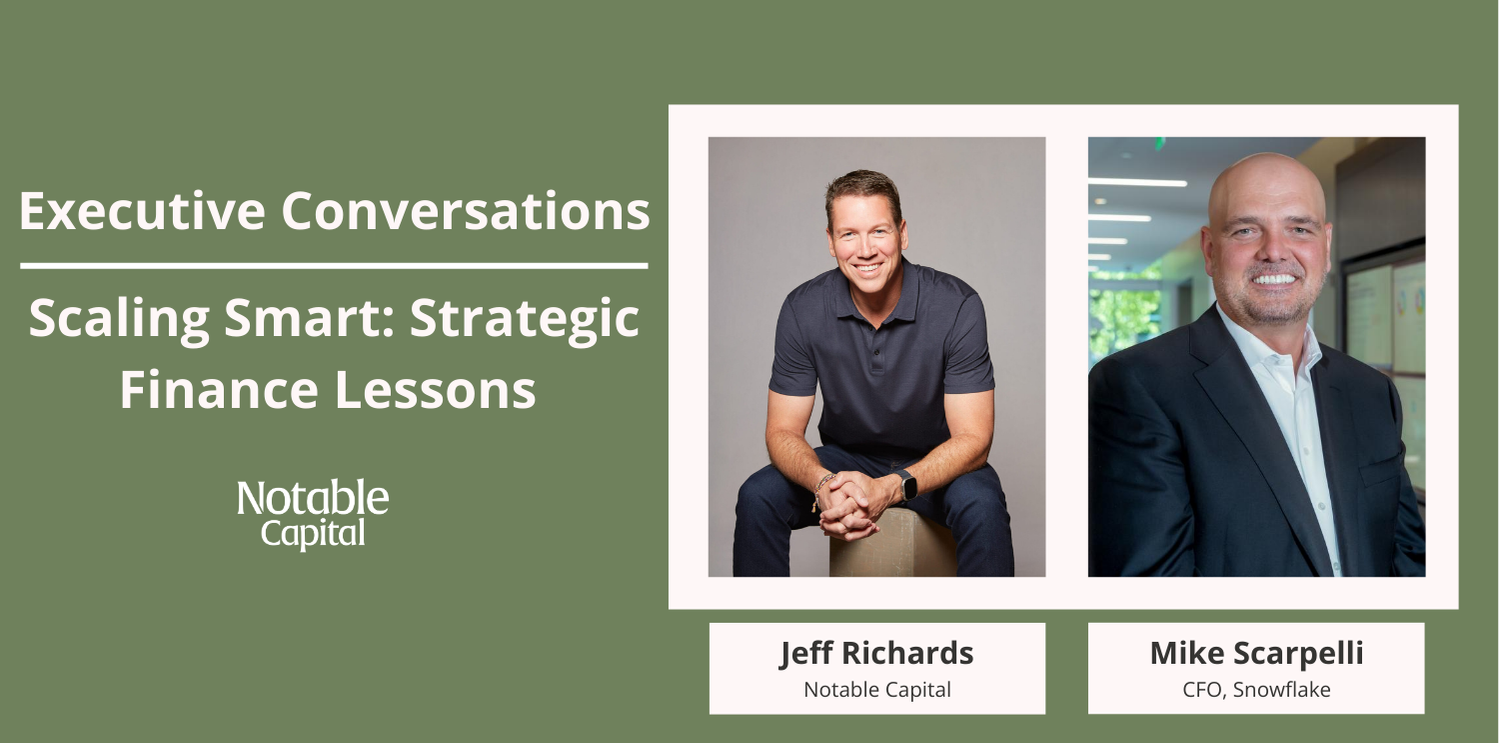0 Results for ""
Scaling Smart: Strategic Finance Lessons from Mike Scarpelli, CFO, Snowflake

As part of Notable Capital’s Founders + Leaders program, we recently sat down with Mike Scarpelli, CFO of Snowflake, alongside a collection of Notable Capital founders and finance leaders to discuss the role of strategic finance.
If you don’t know Mike’s background, here is the TLDR: he’s been the CFO of three very successful venture-backed companies, led each through an IPO, and ultimately helped drive well over a hundred billion dollars in value for shareholders and employees: Data Domain (DDUP, IPO 2007, acquired by EMC for $2.4 billion), ServiceNow (NOW, IPO 2012, current value ≈$190 billion), and Snowflake (SNOW, IPO 2020, current value ≈$58 billion).
Mike is more than a CFO; he’s a strategic operator and key partner to the CEO’s he has worked with. When it comes to scaling a technology company, Mike has truly seen it all. For founders and finance leaders, his playbook is invaluable. Our session with Mike was a private, small group conversation, but below are four key takeaways from our conversation.

1. Finance Starts With Understanding Unit Economics
Not understanding the unit economics of the business is one of the biggest mistakes Mike sees in growth stage companies. When the focus is on growth, growth, growth, not enough attention is paid to the underlying mechanics of growth. As you pour fuel on the fire, CFOs and CEOs need to ask: do we truly know what it costs to acquire and serve our customer? Are our gross margins improving as we scale? Are we optimizing for cash flow, not just bookings? Does our pricing and sales model reflect our long-term focus on the customer?
Companies that focus on efficient growth—where each additional dollar of revenue strengthens the business—are able to attract investors and survive downturns. The best finance leaders work constructively with the CEO and the rest of the executive team to ensure the business is getting better as it scales.
In boom times, investors cheer “growth at all costs.” In downturns, they demand profitability and “efficiency.” The best CFOs plan for both. Mike’s advice? Never assume capital will be easy to raise.
- Enforce pricing and discounting discipline early—if your product margins are weak, fix them before scaling.
- Invest aggressively—but wisely. If top sales reps are exceeding sales quotas, hire more. But if a high percentage of your reps aren’t producing, adding headcount won’t solve the problem.
- Automate aggressively. From finance operations to sales analytics, Mike and his teams are constantly looking for ways to increase leverage without adding headcount.
2. Finance Is Partner To Every Operating Leader
One of the big challenges for finance executives at growth stage companies is that their time is often consumed with “keeping score” - reporting on the numbers (P&L, etc.). Mike talked with the group about the CFO role as helping to “shape the game.” It requires deep alignment with key functional leaders, especially in sales, product, and engineering; not just setting budgets but actively shaping where and how money gets deployed.
Mike talked about the importance of building strong personal relationships with the rest of the executive team. “Show people that you’re there to help them, not police them, spend the time together, give people the data to help them see decisions themselves, don’t surprise people, and especially don’t throw them under the bus.” On this last point, Mike talked about how he’ll have 1-1 conversations with executives about challenges in their department, but never surprise them in a group setting.
When finance acts as a trusted partner, not a gatekeeper, operators listen. Strong relationships accelerate scaling.
3. The Best CFOs Drive Go-To-Market Discipline
Mike talked about one of his companies where when he took over as CFO, the sales team controlled discounting and deal terms. While bookings and growth were strong, the company was sub-optimized from a margin standpoint, and customers were often locked into long term contracts at discounted rates. Mike and the team orchestrated an overhaul of pricing and the sales/pricing/contracting process and drove over 20 points of margin improvement.
Importantly, Mike emphasized the sales team has to view the CFO as “helping them win, not saying ‘no’ to everything.” Orchestrating revised pricing and deal desk strategies is an art. The company also overhauled sales compensation, tying earnings to revenue—not just bookings—so reps maintained long-term incentives.
Net/net a truly strategic CFO can work closely with the CEO and go to market teams to drive meaningful changes which have dramatic effects on the long term financial performance of the company.
4. Founders Often Underestimate How Much Finance Can Shape Growth
Mike spends a lot of time talking to venture-backed founders and CFOs, and is an LP in a number of funds (including ours). “Too many startups treat finance as an afterthought.” They bring in a senior finance leader too late—often shortly before an IPO. It underplays the role a great finance leader can help play in driving sustainable, and improving, growth.
The group talked through several scenarios where CFOs are balancing “efficiency vs growth,” and Mike shared examples where he pushed hard for territory planning, sales segmentation, and tighter metrics on headcount expansion. “You can’t just add salespeople and expect revenue to follow” - Go-to-market investment has to be deeply connected to product expansion, customer service and delivery, and many other pieces of the puzzle. Every sales hire needs the right support, the right accounts, and the right incentives. A great finance team can help the go to market organization truly understand how, and where, to invest aggressively.
If you’re a founder/CEO, ask yourself: “Is our finance team helping drive strategy, or just tracking the P&L?”
Finance Is The Key To Scaling Smart
It’s hard to encapsulate a great conversation in a short post, but as one CFO told us “I took literally four pages of notes.” We are grateful to Mike for spending time with our group - primarily finance leaders from companies ranging from $10 million in revenue to well over $100 million. If we were to summarize the conversation in one sentence, it’d be “The best finance leaders don’t just count the dollars - they help drive the decisions that help those dollars come into the company at an increasing rate over a long period of time…”




.jpg)